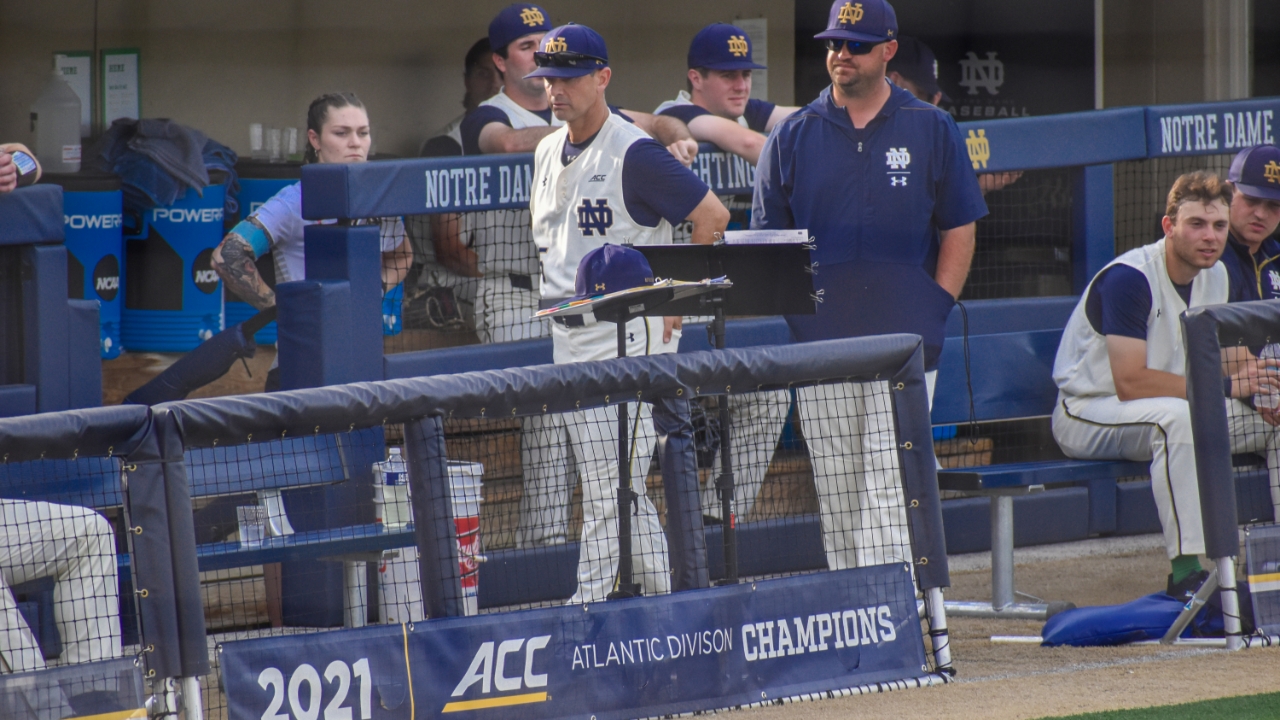Link Jarrett Q-and-A: Fall strides, changing perceptions, forging ahead

Finally, Link Jarrett might have an established, normal fall that leads into a regularly scheduled spring baseball season at Notre Dame.
Maybe.
Since Jarrett was hired to take over the Fighting Irish's flagging baseball program in July 2019, he first had to overhaul the program and then saw the COVID-19 pandemic wreck Notre Dame's promising start to the 2020 campaign.
Those factors continued this past fall and spring, when nonetheless Jarrett helped guide Notre Dame within a game of the College World Series.
Where do the Irish go from here? What's next for Jarrett and the program?
He spent time one-on-one with Irish Sports Daily in a wide-ranging interview.
Part I is below. We'll follow with Part II.
ISD: You're finishing up your first fall after a full season and some time – even with the COVID-19 pandemic – to more fully establish program. What are the things that you've noticed?
LINK JARRETT: Just being comfortable in our terminology and our system is the most important thing.
We want to continue to recruit, and we hope to bring quality student-athletes in that fit here at Notre Dame and that's every sport, every year.
But we've been able to get in our meeting space, the batting cages, bullpens, and the guys just know our terminology, our expectations in each of those spaces.
When that becomes easily transmitted, you just are more efficient with what you're doing. As a coach it's so great to have an older group, and we've got those veterans whose those names jump out.
And, there's a hunger. There's a hunger. It didn't end the way we wanted this to end [in the Game 3 Super Regional loss at Mississippi State]. It was a remarkable year, it was amazing. It's very difficult to come out on the top of this thing. There's still a kind of hunger and determination to be in that same position next year. It's very difficult to pull that off, but the importance of every pitch in every one of those games, especially when you get into the month of June, they all know it.
That's your beacon in the night to what it takes to win a national championship. So I think that hunger and that vision helps those guys show up every day and work.
ISD: What has been the fall focus, and have you seen new leaders and ownership of the team emerge?
LJ: We lost a power bat (Niko Kavadas) and we lost a very powerful versatile pitcher (Tanner Kohlhepp).
They're All-Americans. Somebody's going to go play first base, and somebody's going to have to be a leverage arm out of the pen. Those two guys flourished in their roles, and Kohlhepp was able to answer the bell in the third inning, second inning, seven-eight-nine. How we acclimate our personnel to filling those spots is important.
We have some guys that are capable of bunting, and those things. I don't think it played into our offense as much as it needs to. Especially the guys that have that DNA.
And on the mound, we need to punch people out. I think probably the biggest indicator of team's ability to win is how many people your pitching staff punches out.
We have some young arms that have shown us that they might be able to really rack up some punch-outs in key situations. I think that would be the thing from the pitching side, how do we finish people off.
(John Michael) Bertrand, (Aidan) Terrell, (Will) Mercer, they're phenomenal left-hand pitchers. But maybe there are going to be some guys that come in seventh-eighth-ninth innings, they can get you a couple of punch-outs when there is traffic. We have to try to harness that ability to punch people out.
Chuck (Ristano) has done a phenomenal job of managing the day to day [for the pitching staff], to put them in roles that allow them to flourish and giving them the big-picture stuff. When you dive into some of the technology capabilities that you have, TrackMan, some of the other things we have, what pitches work and the profile of the pitch and the spin of the breaking ball, the spin of a fastball, trying to figure out where guys actually need to go [in the strike zone] individually to record punch-outs.
Should it be down and out? Or can we maybe steal some pitches off the plate because of the angle? And then the catcher's understanding and how to block, to maybe set something up from an 0-2 count to a 1-2 count. The more data you have, it's probably most applicable to the pitching side, each one gives you about 20 different metrics you can use. They're learning what they possess and how to best use it.
ISD: As you move forward, both working with your team and as you've recruited across the nation since the end of last season's run, what's the importance of the perception established, that Notre Dame can be a national player for the first time in a long time.
LJ: How can you win the regular season? That's what I set out to do every year, and it has been anywhere I've ever been. When you're going through a long conference season, three games apiece on the weekends and you've heard me say it, I've told you guys, it's like a Super Regional every weekend in our league.
Everything you do, your scouting report, how you manage Friday, Saturday and Sunday, the long grind of it is what I'm trying to prepare them to come out on top in. I've been fortunate to do it in a lot of different leagues.
Postseason is now a sprint. It's a short, very intense burst. And when you get to a Super Regional, it's even more condensed. Omaha is the most unusual college championship format because it's its own unique event.
I don't think the ACC got the recognition it deserved (in 2021) because the ACC played each other more than other leagues.
So that's how I looked at the season. To come out and run away with the ACC, I don't think we necessarily saw that.
But all credit to the players. They did this. We tried to put them in position to have success. But ultimately it's their execution and performance, and that's the difference. We're not on the field, they are.
What we did last season, it changes the look of our program, there's no doubt.
But I don't want this to be a one-off good year. We are geographically probably one of the more difficult spots in the ACC year in, year out (due to weather constraints).
We've been able to function out of the gate, and I like how we have been able to use the indoor facility. There's a long grind of it all, but we have been able to start with a good level of play and we want to continue that.
Does that equate to an ACC championship every year? Probably not. Does it allow you to be competitive every year? It should. It's just a great transformational moment for our program.
I wish it (the Super Regional) had been here. We should not have been there. That's another story.
But yeah, it got the attention of recruits, there is absolute no doubts.
